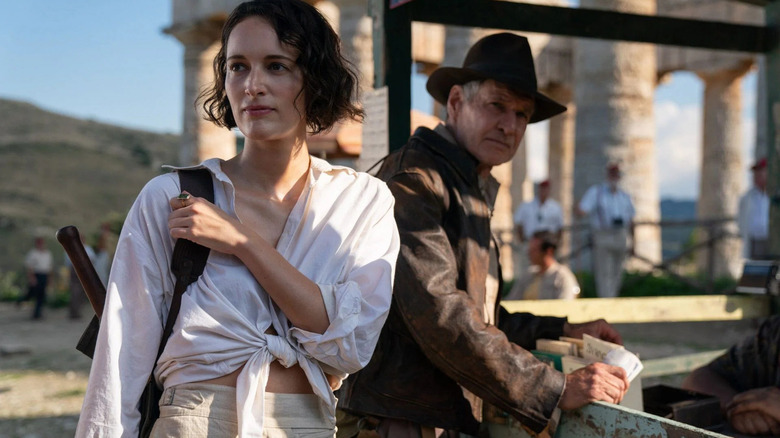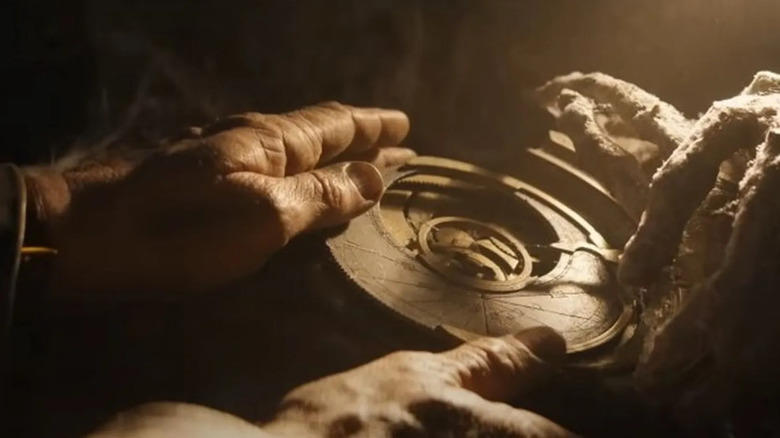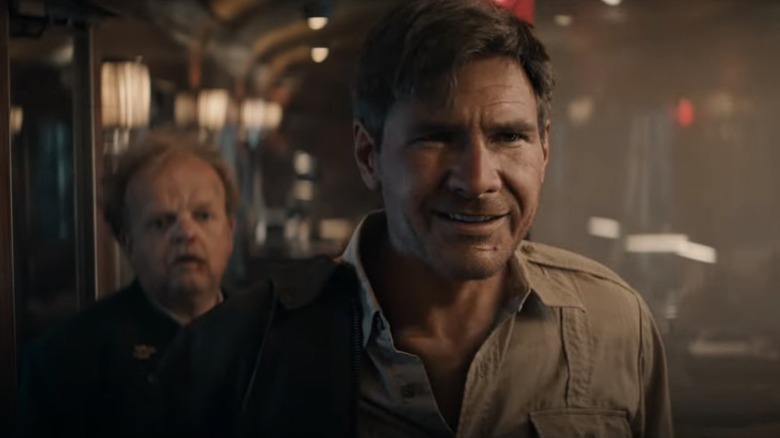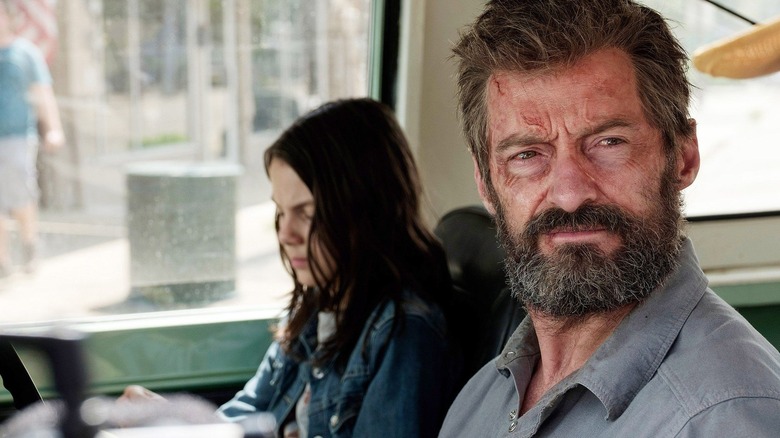Indiana Jones And The Dial Of Destiny Director Didn't Want To Be A Part Of A Franchise
The first four films in the Indiana Jones film series were directed by Steven Spielberg, the last one being "Indiana Jones and the Kingdom of the Crystal Skull" in 2008. Fifteen years later, the series will be returning for what is presumed to be its final chapter with "Indiana Jones and the Dial of Destiny," due in theaters on June 30, 2023. "Dial" was directed by James Mangold, the filmmaker behind Oscar darlings like "Girl, Interrupted," "Walk the Line," and "Ford v Ferrari," as well as notable genre films like "3:10 to Yuma," and "Knight and Day." He also directed two of the films in the X-Men series, "The Wolverine" and "Logan." The latter is handily one of the best superhero films ever made.
Despite his involvement in the X-Men movies, and now in the fifth Indiana Jones picture, Mangold is ambivalent about gigantic commercial film franchises. In a recent interview with Variety, Mangold talked about Hollywood's utter dearth of creativity, and how gigantic ultra-commercial tentpoles are ruining the cinematic landscape. Just as many critics and audiences have noticed, Mangold seems to feel that the Marvel Cinematic Universe has trained audiences to see every film as a smaller piece of a gigantic super-narrative. Working in such a creative milieu, Mangold says, is tantamount to working in television. He doesn't like to view cinema as a prolonged TV exercise, saying "I am interested in making something that works from beginning to end — to curtain."
As such, when Mangold was offered a chance to direct an Indiana Jones movie, his initial reaction was to say no. This was not necssarily an "opportunity" for Mangold, at least not in terms of success or commercial clout.
Working with heroes
Mangold, incidentally, served as producer on the heartfelt survival film, 2020's "Call of the Wild," which starred Ford. Eventually, he took on the "Dial" job because it would be an opportunity to work with an actor and director he loved. He knew stepping into a long-running film franchise like Indiana Jones was fraught, but, well, Ford and Spielberg, man. He said:
"There are a million land mines. [...] but the idea that I would get a chance to play not just in the backyard of my heroes, but with Harrison, with Steven — it was so profoundly moving to me. How many people get a chance to make a movie with these people?"
Mangold may have also softened to the idea of franchise filmmaking, as some of his next scheduled projects are, as of this writing, a feature film about the Swamp Thing, a monster from the DC Comics universe, as well as a "Star Wars" feature film. Still, Mangold wanted to make sure that his film functioned on its own, and wasn't merely a rehash of things that came before. Yes, evidently he was very frank with producer Kathleen Kennedy about his dislike of the much-derided "Crystal Skull." At the same time, though, Mangold knew he couldn't stray from the style and tone established by Spielberg in his previous movies. "I wasn't looking to make the movie my own," he said to Variety. "I would say I was looking to have a voice." It seems to be a tricky balance. He likened it to pinch-hitting for Babe Ruth, and would constantly ask himself how Spielberg might shoot a particular scene.
Mangold also knew that the most dreaded of pundits, the entertainment journalist, would lambaste his new film, regardless of how it turned out.
Franchiseland
Of that, Mangold said:
"When you're in franchise land, it's very hard for critical thinkers to overlook what I'm sure their editors want, which is this business prism of how does it rate to the other ones? I always thought if I were second or third best to one of the greatest films of all time, I'd be good. I mean, it all vaporizes later. Either the movie will live or it won't."
The director seems to know that a lot of outsize Hollywood franchise pictures are largely ephemeral. When it comes to the discourse surrounding a certain kind of outsize commercial genre entertainment, movies are either stacked in a haphazard pile of arbitrarily canonical geek properties (the "good ones") or dismissed as disappointments, only discussed in direct comparison to the other movies in its franchise (the "bad ones").
Certain filmmakers know that many, many established fans attend these outsize Hollywood franchise pictures, and begin to warp the content of their film to match a very specific — and very predictable — expectation. Mangold knows about Easter eggs and references and the widespread pop-cultural onanism that is engaged in regularly. That kind of filmmaking, Mangold says, is the opposite of creativity. He doesn't care about nostalgia or fan service. In his words:
"I'm not interested. [...] I refuse. I just can't do it. [...] The amount of lore and Easter eggs and fan service starts to become antithetical to any of this stuff at a certain point. It isn't storytelling anymore. It's large-scale advertising."
Indeed, how many Marvel movies exist as previews for an upcoming crossover event? One might posit that it's most of them.
Baby Wolverine
When Mangold made "Logan" in 2017, it was novel because, unlike so many superhero movies, it brought a character's arc to an end. "Logan" was set in the future, and saw Wolverine (Hugh Jackman) aging out of superherodom and facing his mortality. The film ended with the character dying in one final, modest act of heroism. It seems that it should have been the definitive end for a character who had already appeared in eight feature films. As it seems to work, though, the Hollywood machine couldn't leave well enough alone; Jackman will return as Wolverine in the upcoming film "Deadpool 3," a movie in the MCU.
Mangold was wearied by the news, saying:
"I can't say that there's a part of me that doesn't wish that we'd let it be. [...] But there was always going to be another Wolverine. There could be a baby Wolverine and a cartoon Wolverine. As much liquid as they can squeeze out of that rag, they're going to try to. I don't measure my success on a movie like 'Logan' with whether we ended the conversation. I ended my conversation."
Mangold may have an ambivalent view toward the Hollywood machine, but he still likes to work on his creative projects. His next film will be a biopic of Bob Dylan, set to star Timothee Chalamet. Exploring a famous musician again (after "Walk the Line") will hold more interest to Mangold than trudging through "Star Wars" for the umpteenth time.
"Indiana Jones and the Dial of Destiny" releases in theaters on June 30, 2023.



